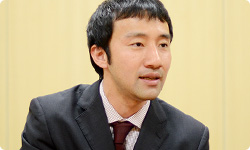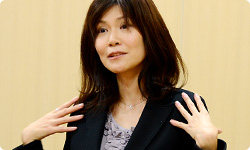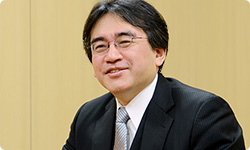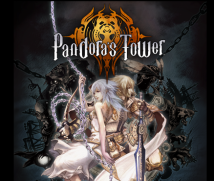6. I'm So Sorry!
Nakano-san, looking back on the project, could you tell me about the final push to get it finished?
Why don’t you tell him about that time you said: ‘I’ll have it done within two months’?
Ah, yes. (laughs) Well, up until that point I’d always stuck to deadlines, and when something has already been put together, I’m loathe to take it apart and reconstruct it in a different way. That’s why, as far as possible, I’ll try to make adjustments within the existing structure. So I said to Yamagami-san: ‘I’ll have it done within two months.’ He responded with: ‘What are you setting yourself limits like that for? If you think something has to be fixed, you should spend as much time as you need to get the job done! I’ll talk to Iwata-san about the budget and getting more time!’
Right! (laughs)
It was then that I suddenly realised that I’d been trying to keep all the changes to the bare minimum. I realised that what this game was lacking was the capacity to draw the player in emotionally, and that if we left it in this state, the player would be able to tell. I knew that this was the area of the game we needed to get working on.

I really didn’t want the project to come to an end with things still in this state. At first, Nakano-san said he’d have it done in two months, and wouldn’t compromise on that. We had ongoing discussions where I’d say: ‘Do you really think you can just leave it like this? Come on, tell me what you really think?’
It got quite heated, didn’t it?
Yes, it really did.
There were several other games that were on the horizon, so I’m afraid I found myself thinking that from the point of view of the release date, it would be better to get it finished quickly.
But that emotional engagement with Elena lies at the very heart of the game. I was also urging Yamagami-san to sort this out.
That’s right. You were saying the same sort of things to me, Iwata-san. Just after we’d done that testing and gathered the feedback, you asked me: ‘Yamagami-san, has it really turned out as you originally envisaged?’ Those words really hit home.
I put it quite harshly. But if we’d left things as they were, without achieving what we were aiming for, there’s simply no way it would have engaged the player emotionally.
This was right at the point when we were racking our brains trying to come up with ways to get the player to feel affection for Elena, to no avail. It was an extremely tough time. But then just after that, we got those hints on the way to get the player to engage emotionally with Elena. After that, it all came together very quickly. So I’m very glad that in the end we were fully committed to coming up with a solution.
Yes, that’s right. When we received that advice, I felt that now we had what we needed to get the job done. With Ganbarion’s agreement, we discarded all of the voice recording we’d done for Elena, reworked those lines, and re-recorded them.
Yes, after that we were essentially holed up inside the office. We reworked all of Elena’s lines and scenes so that you’d sympathise with her heartrending situation and want to return home to her. It was exactly a year before mastering was scheduled. I locked myself in the office and didn’t emerge at all. In the end, I lost about 10 kilos, so I didn’t want to be seen in public. That’s how bad things were. But I just kept recalling what you’d said to me back when I gave the initial presentation, Iwata-san: ‘Make sure you never forget what you set out to achieve.’ I would keep asking myself why we hadn’t managed to achieve what we had been aiming for.

And that’s how Pandora was finally completed.
Yes, and it really took a long time. The issue of how to make the player sympathise with Elena turned out to be a much more complex one than we had initially thought, and so we kept losing sight of the finish line. After all, you don’t just suddenly fall for people when you’re going about your everyday life. It’s when you’ve been spending time with them that you realise: ‘Ah, I really like them.’ That would normally be clear, but you lose sight of that when you’re absorbed in making the game.
Well, you’re just not thinking about these issues in your day-to-day life, are you?
But from last spring, I was really pleased to see that the emotional attachment you felt towards Elena was much stronger, and now that I was able to sympathise with her plight, it felt as if I loved her. When we tried to force people to feel affection for her, it just didn’t work. But by changing tack and getting them to sympathise with her, you’d end up naturally falling for her.
You were in tears, weren’t you, Yamagami-san? (laughs)
Yes, I was! (laughs) During the testing phase, people would say things like: ‘I don’t think a girl like Elena would say something like that.’ By making changes based on these comments, Elena really grew to become her true self.
At Ganbarion, did you also find your feelings for Elena growing stronger?
Yes, they did a lot get stronger. After making the changes you’d suggested, the dev team felt that the image of Elena, which had previously been rather out of focus, had suddenly become much sharper.
Particularly after the design changed for Elena’s post-transformation state, people started saying: ‘Oh, poor Elena...’ You really felt you wanted to save her and there wasn’t a moment to lose. Those images fit with the re-recorded lines and I felt sure that this was going to work. We had seen the game develop from the start, and it was still eliciting this intense response. That’s how we knew that it would be sure to touch people who played it for the first time.
But having said that, to have nothing but pathetic scenes would have been overdoing it, so we made a lot of bright, upbeat scenes too. In these scenes, Elena is singing beneath a clear blue sky, or picking flowers, and just seeing them cheers you up. So it wasn’t just sympathy we wanted to elicit. We also wanted them to feel affection for Elena.
As a result, Elena’s character developed so she became a strong person who never abandons hope no matter how bad her predicament gets. You feel a strong desire to protect her, so even if she undergoes the most minor transformation, you feel terrible about it and end up apologising to the screen: ‘I’m sorry! I’m so sorry! If only I’d got back a little faster, this wouldn’t have happened. I’m so, so sorry!’ (laughs)
So before you know it, you’re apologising to your TV screen.

That’s right. You end up weighing things up very carefully – you’re enjoying exploring the towers, but you’re thinking: ‘Maybe I should head back.’ The balance between those elements really makes it a lot of fun.
Now that we had the emotional engagement with Elena right, you’d even have people at Mario Club playing who would say sorry when they’d failed to stop Elena being transformed into a beast.
So even at Mario Club, they’d be shouting: ‘I’m so sorry!’
That’s right. In the end, there was no one neglecting Elena or feeling that going back was a pain. That’s when I realised we’d ended up getting this element of the game right.
It’s just so funny to see you talking about all these emotions so matter-of-factly, Nakano-san!
He doesn’t normally discuss these kinds of emotions. (laughs)
I suppose you’re right. (laughs)
Did you find yourself saying sorry too, Nakano-san?
Yes. I really felt emotionally engaged in the story.
So looking back on it, you were being a little too hopeful when you said: ‘I’ll get it done within two months.’
I tried to get out of making major changes, and now I’m deeply ashamed of myself. (laughs)
